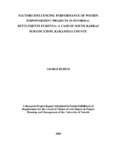| dc.description.abstract | The purpose of this study was to investigate factors that influence performance of women empowerment projects in South Kabras Sub-location, Malava constituency of Kakamega County; Kenya. This study was designed to fulfill four objectives: relationship of socio-cultural factors, capacity building, access to capital and technology on performance of women empowerment projects. The study was significant in revealing challenges and opportunities in women empowerment projects and their capacity to alleviate poverty in women. This was intended to optimize performance of the women empowerment projects. The study adopted descriptive survey design targeting a population of 220 respondents. The population comprised of staffs of Ministry of Sports, Gender and Social Services and members of the beekeeping, dairy cow, fishpond and brick making women empowerment projects in South Kabras Sub-location, Malava constituency of Kakamega County. Stratified random sampling was used to select 186 respondents from the 4 women empowerment projects. However, 4 project leaders and 2 Ministry of Sports, Gender and Social Services staff were purposively sampled for interview. The researcher made observation and recorded the results for the purpose of triangulation. The Ministry of Sports, Gender and Social Services staff, were considered as this is the ministry that registered and oversaw the operations of the women groups on behalf of the Government. Validity of research instruments was done through review by supervisor whilst ensuring clarity in language in order to capture the relevant data. To ensure reliability in the research instruments, pilot-test was conducted on 20 women from the groups. The reliability test was calculated and the result of the Cronbach Alpha coefficient was 0.87. The group of 20 women involved in the pilot study was not involved in the research. Data analysis was done using descriptive and inferential statistics especially by use of frequency tables and percentages. The performance of empowerment projects and the socio-cultural factors, capacity building, access to capital and technology had a correlation coefficient of 0.91, 0.93, 0.97, and 0.92 respectively. This translates to coefficient of determination of 82.8 percent, 86.5 percent, 94.1 percent, and for 84.6 percent for socio-cultural factors, capacity building, access to capital and technology respectively. This highlights that access to capital had the highest influence to performance of women empowerment projects followed by capacity building then technology and finally socio-cultural factors. Socio-cultural factors had least influence. This was against the perception that socio-cultural factors had the greatest influence on performance of women empowerment projects. The study recommends that NGOs and CBOs should empower the community primarily with education, to overcome effects of retrogressive socio-cultural factors that hinder performance of women projects. Women should also take advantage of available capacity building opportunities available in the media, internet, trade fairs and public gatherings. Policy makers should come up with funding strategies of women projects to permit women empowerment projects access credit. Technology service providers should reach out to the rural areas for Corporate Social Responsibility and create market for their products. | en_US |

